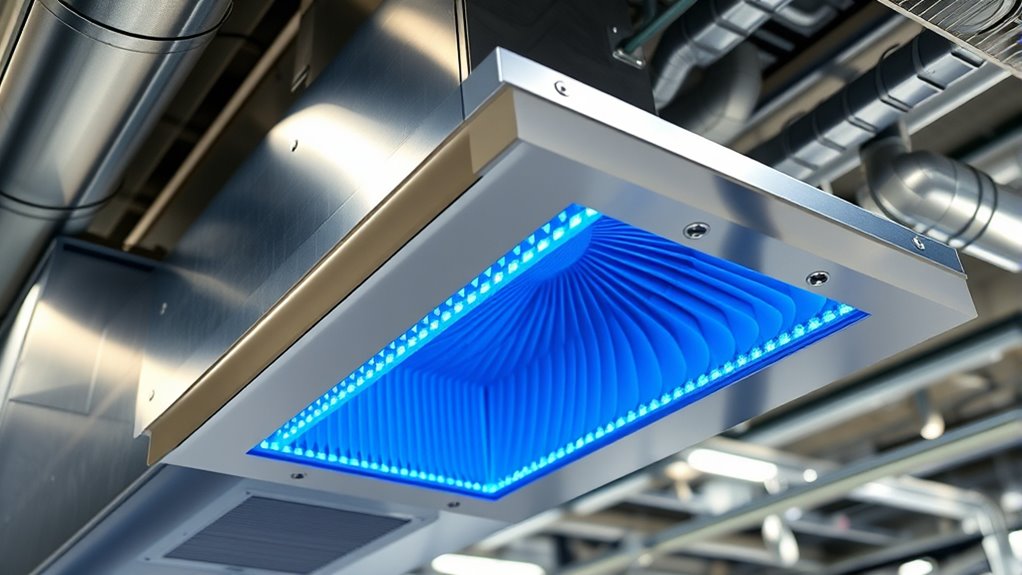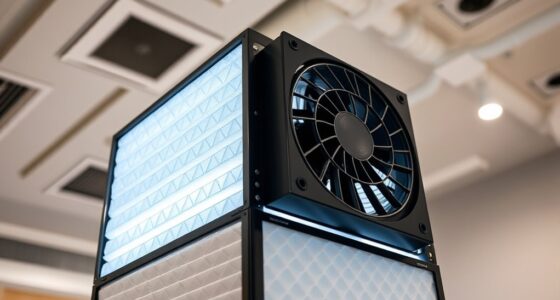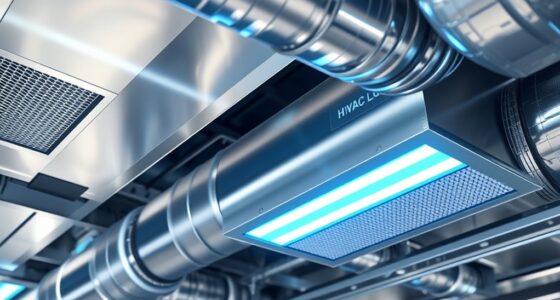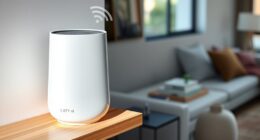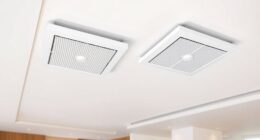Advanced filtration in commercial HVAC systems is essential for maintaining clean, healthy indoor air by effectively capturing dust, allergens, bacteria, and VOCs with specialized filters like HEPA, electrostatic, and activated carbon types. Proper maintenance, including regular inspections and replacements, ensures filters perform at their best, improving airflow, reducing energy costs, and protecting occupant health. Keeping filters in top shape prevents system wear and enhances indoor air quality—if you want to learn more about ideal filtration practices, keep going.
Key Takeaways
- Advanced filtration systems like HEPA, electrostatic, and activated carbon filters enhance indoor air quality by trapping microscopic pollutants and VOCs.
- Proper maintenance, including regular inspection and replacement, ensures filters operate efficiently and extend HVAC equipment lifespan.
- Sealed filters prevent unfiltered air bypass, maintaining system performance and protecting occupant health.
- Modern HVAC systems incorporate indicator alarms to monitor filter status and prompt timely replacements.
- Effective filtration reduces energy costs, improves airflow, and creates healthier indoor environments for commercial spaces.
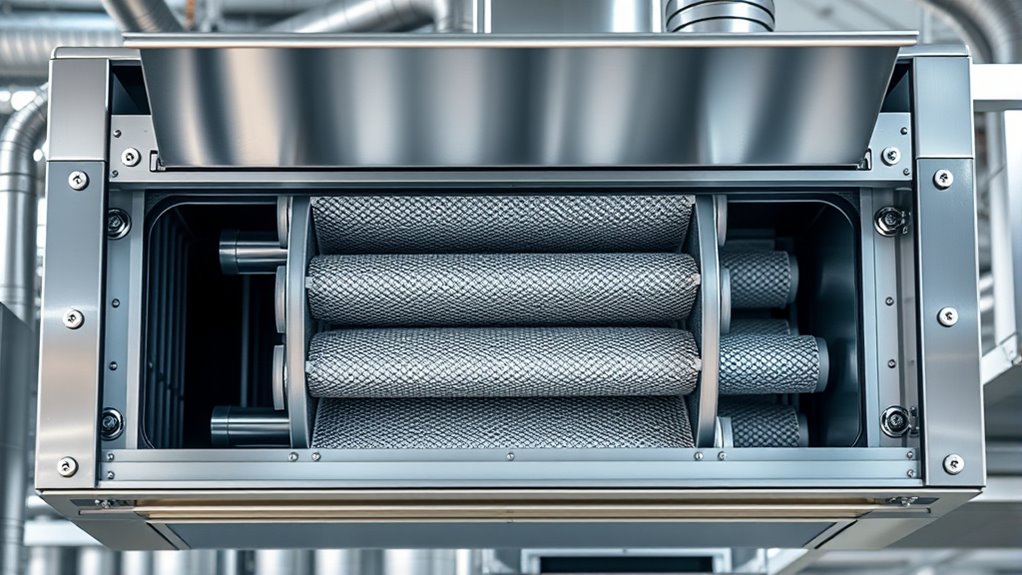
Have you ever wondered how commercial HVAC systems guarantee the air you breathe is clean and safe? It all comes down to advanced filtration systems designed to improve air quality and protect your health. These systems use specialized filters that trap dust, allergens, bacteria, and other airborne contaminants, ensuring that the air circulating through your building is as pure as possible. But even the best filters won’t do their job effectively without proper filter maintenance. Regularly inspecting, cleaning, or replacing filters keeps the system running efficiently and maintains ideal air quality.
Proper filter maintenance is essential for clean, safe indoor air quality and efficient HVAC operation.
You might not realize it, but filter maintenance is critical to ensuring your HVAC system performs at its best. Over time, filters become clogged with particles, reducing airflow and forcing the system to work harder. This not only diminishes air quality but also increases energy costs and accelerates system wear and tear. When filters are neglected, airborne pollutants can bypass the filtration system altogether, circulating through the indoor environment and impacting the health of everyone inside. So, staying on top of filter maintenance isn’t just about efficiency; it’s about safeguarding the air quality you and others breathe daily.
Advanced filtration technology in commercial HVAC systems often involves high-efficiency particulate air (HEPA) filters, electrostatic filters, or activated carbon filters. These options provide different levels of filtration tailored to specific needs, whether it’s capturing microscopic particles or removing odors and VOCs (volatile organic compounds). Proper filter maintenance ensures these filters perform at their peak, which means regularly checking for dirt buildup, replacing filters in accordance with the manufacturer’s recommendations, and ensuring seals are intact so unfiltered air doesn’t bypass the filter media. Many modern systems also feature indicator lights or alarms to alert you when filters need attention, making it easier to stay proactive.
Maintaining good air quality through effective filtration also involves a routine cleaning schedule for the entire HVAC system, including ducts and vents. This prevents dust and debris accumulation that can compromise filter performance. When filters are maintained properly, you’ll notice improved airflow, reduced energy consumption, and a healthier indoor environment. It’s a small investment of time that yields significant benefits, especially in commercial spaces where many people gather. Additionally, understanding filter types and their maintenance requirements can help optimize system performance and ensure the best possible air quality.
Ultimately, understanding the importance of air quality and committing to regular filter maintenance is key to ensuring your HVAC system delivers clean, safe air. By doing so, you not only extend the lifespan of your equipment but also create a healthier environment for everyone inside your building.
Frequently Asked Questions
How Often Should Advanced Filters Be Replaced in Commercial HVAC Systems?
You should replace advanced filters in your commercial HVAC system every 6 to 12 months, depending on usage and environment. Regular replacement guarantees ideal filter lifespan and maintains air quality. It’s crucial to follow a consistent replacement scheduling, especially if your system operates in high-traffic or pollutant-heavy areas. Check the manufacturer’s guidelines and monitor filter conditions periodically to avoid airflow issues and ensure your system runs efficiently.
What Are the Cost Differences Between Standard and Advanced Filtration Options?
You’ll find that standard filters generally cost less upfront, making them appealing for budget constraints, but advanced filtration technology often costs more initially. However, a thorough cost analysis reveals that advanced filters can save you money long-term by improving air quality, reducing energy use, and decreasing maintenance needs. While the initial investment is higher, the enhanced benefits of advanced filtration justify the cost differences, providing greater value over time.
Can Advanced Filters Improve Indoor Air Quality During Pollen Season?
Yes, advanced filters can considerably improve indoor air quality during pollen season. They effectively capture airborne allergens like pollen, reducing their presence indoors. You’ll also notice a longer filter lifespan because these filters are more efficient at trapping particles without clogging quickly. This means cleaner air and less frequent filter changes, keeping your space healthier and more comfortable during allergy season.
Are There Specific Maintenance Protocols for High-Efficiency Filters?
Think of maintaining high-efficiency filters like caring for a delicate plant—you need to be attentive. You should regularly check filter lifespan and replace filters before they clog or lose effectiveness. Always guarantee filter compatibility with your system to prevent damage. Follow manufacturer guidelines for cleaning or replacing filters, typically every 3 to 6 months, depending on usage. Proper maintenance keeps your system running smoothly and ensures ideal air quality.
How Do Advanced Filters Impact HVAC System Energy Consumption?
Advanced filters can reduce your HVAC system’s energy consumption by improving airflow and enhancing efficiency. They often lead to energy savings because they require less power to move air through cleaner, high-quality media. Additionally, these filters tend to have longer filter longevity, meaning you replace them less often, which further conserves energy and reduces maintenance costs. Overall, investing in advanced filters optimizes system performance and saves you money over time.
Conclusion
Implementing advanced filtration in your commercial HVAC system considerably improves indoor air quality, creating a healthier environment for everyone. Did you know that proper filtration can reduce airborne particles by up to 99%? This not only protects your staff and customers but also enhances HVAC efficiency and longevity. Investing in this technology is a smart move that pays off in safety, health, and long-term savings. Prioritize advanced filtration to make certain a cleaner, safer space for all.
